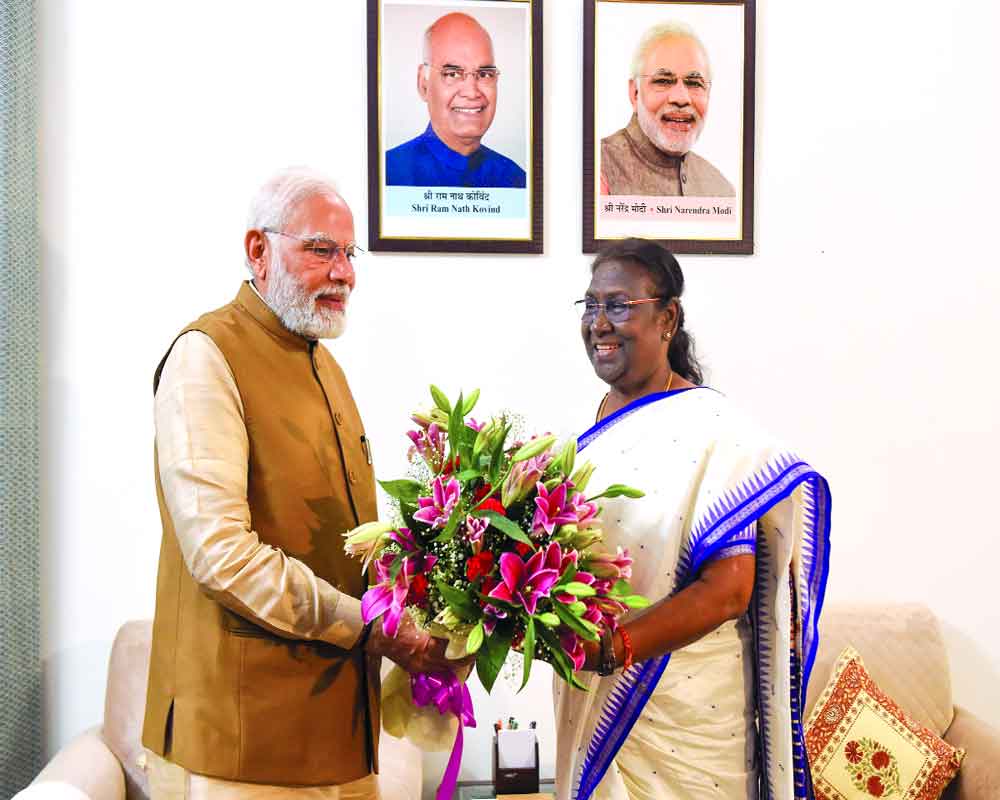Murmu secures votes worth 6,76,803 against Yashwant’s 3,80,177
Droupadi Murmu on Thursday won the Presidential election with a massive margin and created history by becoming the first tribal to occupy the top constitutional post in the country.
Mumu, the second woman to reach the Rashtrapati Bhawan will be the 15th President of India. At 64, she is also the youngest President of India. Fielded by BJP-led NDA, Murmu beat the Opposition nominee and former Union Minister Yashwant Sinha.
A total of 4,754 votes were polled, out of which 4701 were valid and 53 were invalid. The quota sufficient to get a candidate elected was determined by dividing the number of first preference votes secured by both candidates by two and then adding one to the quotient. The said quota was 5,28,491. Droupadi Murmu secured 284 first preference votes, value of which was 6,76,803, whereas 1,877 first preference votes were secured by Yashwant Sinha, value of which was 3,80,177. As the first preference votes secured by Droupadi Murmu was greater than the requisite quota, the Returning Officer, declared Droupadi Murmu duly elected to the Office of the President of India.
In every round of counting, she received more than two-third votes. At least 17 MPs from Opposition parties cross-voted in the presidential election in favour of Murmu, sources said.
After the announcement of the result, Opposition’s presidential nominee Sinha extended best wishes to Murmu.
“I join my fellow citizens in congratulating Murmu on her victory in the Presidential Election 2022. India hopes that as the 15th President of the Republic, she functions as the Custodian of the Constitution without fear or favour,” Sinha tweeted.
He said the issues he raised during his campaign remain pertinent and despite the outcome of the election, he believes it has benefited Indian democracy in two important ways. “It brought most Opposition parties on a common platform. This is indeed the need of the hour, and I earnestly appeal to them to continue — indeed, further strengthen — Opposition unity beyond the Presidential election. It must be equally evident in the election of the Vice-President,” he said.
In his congratulatory message, Prime Minster Narendra Modi said, “Murmu’s life, her early struggles, her rich service and her exemplary success motivates each and every Indian. She has emerged as a ray of hope for our citizens, especially the poor, marginalised and the downtrodden.”
The new president-elect will take oath on July 25 as incumbent President Ram Nath Kovind’s tenure is ending on July 24.
The one-day presidential voting ended on Monday with over 99 per cent of the electors exercising their franchise which included, among others, Modi, former Prime Minister Manmohan Singh and Home Minister Amit Shah.
Given the support extended by many Opposition parties outside the NDA fold, Murmu’s victory against Sinha was a foregone conclusion.
The NDA candidate’s vote percentage widened to over 60 per cent with the support of non-NDA Opposition parties including Jharkhand Mukti Morcha, JDS, BSP, Shiv Sena, AIADMK and Akali Dal. Andhra Pradesh’S ruling YSR Congress and Odisha’s BJD also extended their support to Murmu.
Murmu was born on June 20, 1958, in Uparbeda village of Mayurbhanj district in Odisha in a Santhali tribal family to Biranchi Narayan Tudu. Her father and grandfather were village heads under the Panchayati Raj Systems.
She married Shyam Charan Murmu, a banker who died in 2014. The couple had two sons, both of whom passed away, and a daughter Itishri Murmu.
Murmu started out as a schoolteacher before entering State politics. She worked as an Assistant Professor at the Shri Aurobindo Integral Education and Research Institute, Rairangpur, and as a Junior Assistant at the Irrigation department of the Government of Odisha.
She joined the BJP in 1997 and was elected as the councillor of the Rairangpur Nagar Panchayat. In 2000, she became the Chairperson of Rairangpur Nagar Panchayat and also served as the national vice-president of BJP Scheduled Tribes Morcha. During the BJP and Biju Janata Dal coalition Government in Odisha, Murmu served in ministerial positions in Odisha. In anticipation of victory of their illustrious native, locals of Murmu’s hometown Rairangpur prepared 20,000 ladoos for distribution among the people and hoardings have been put up congratulating “Odisha’s daughter” as they expressed confidence in her win and geared up for celebrations. Various local organisations such as traders’ bodies, bar associations, and religious and educational institutions, and even Government officials are waiting with palpable enthusiasm to congratulate the “daughter of the soil”.
In November 2016, the Raghubar Das-led BJP Government had passed amendments to two centuries-old land laws — the Chotanagpur Tenancy and Santhal Pargana Tenancy Acts — that would have ensured easy transfer of land for industrial use. As the amendments led to massive protests by tribal communities across the State and with close to 200 delegations calling on then Governor Murmu, eight months later, in June 2017, she returned the laws asking the Government to clarify how the amendments would benefit tribals.
























